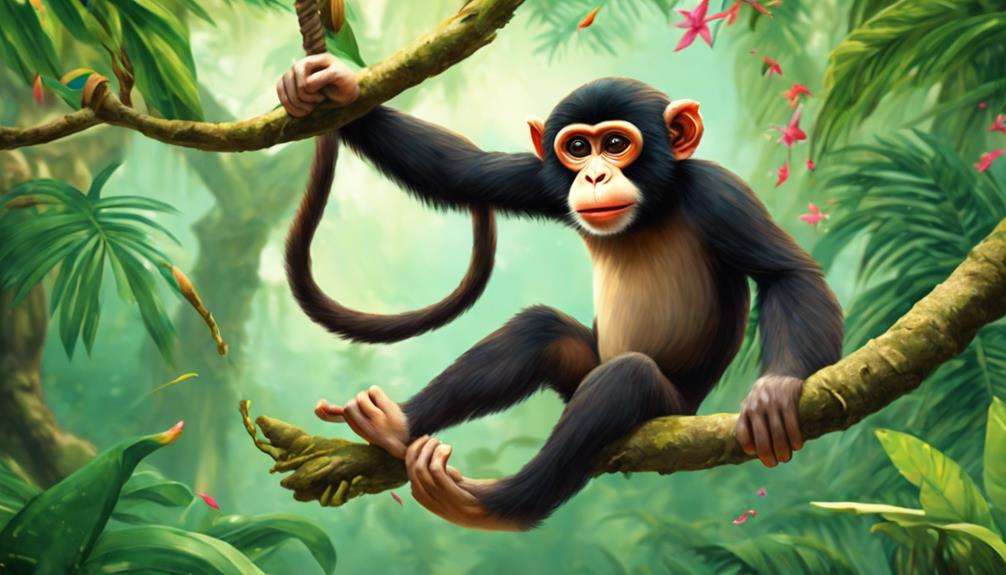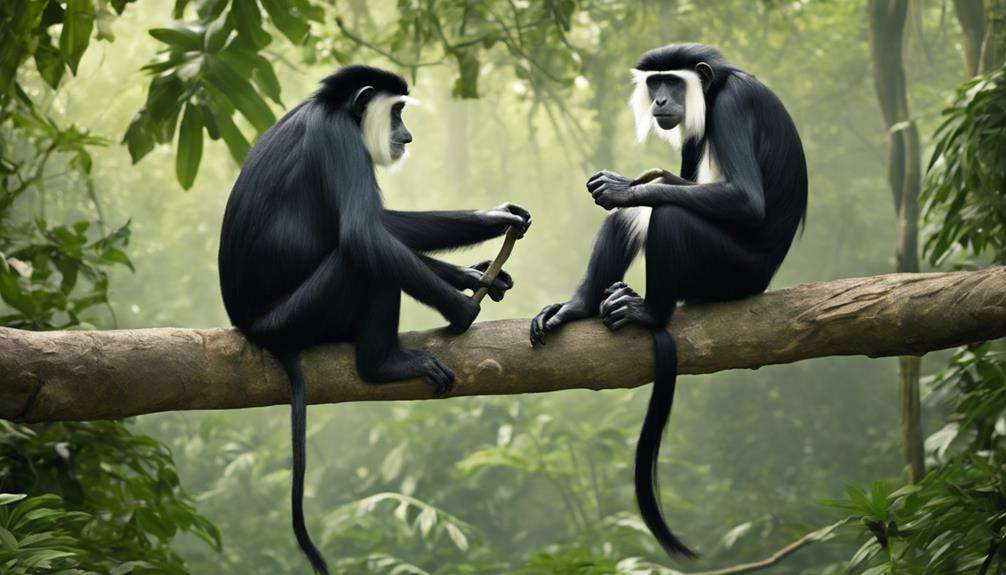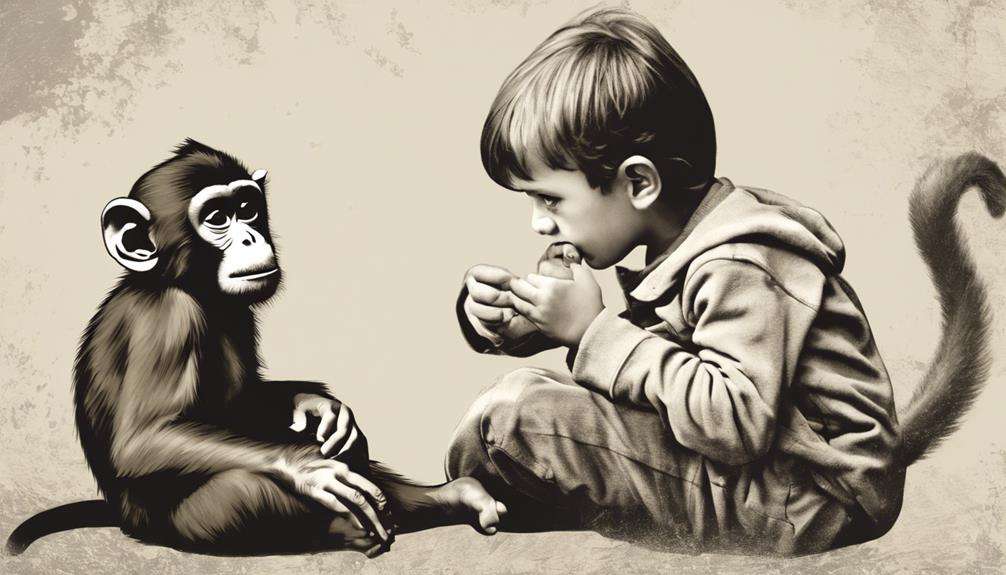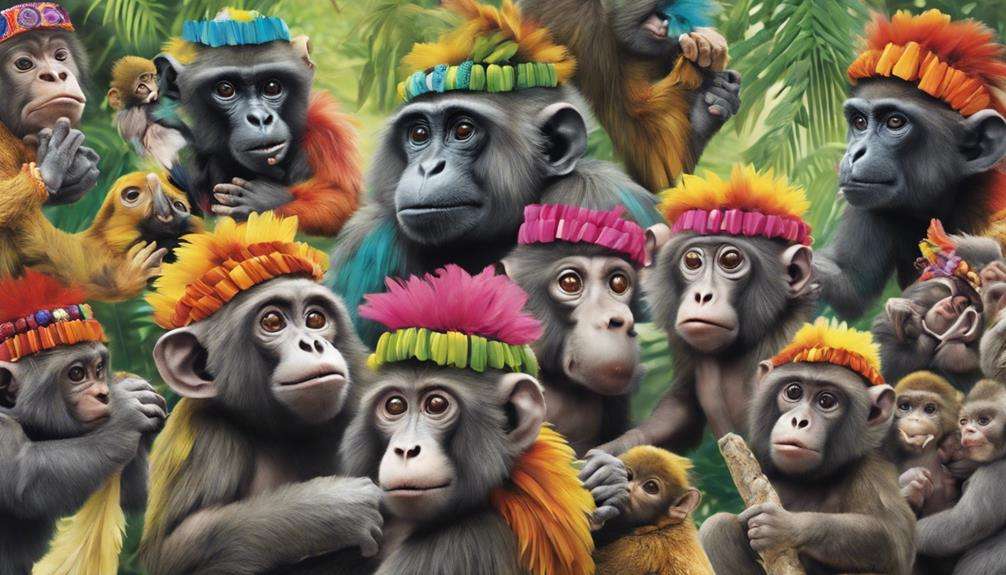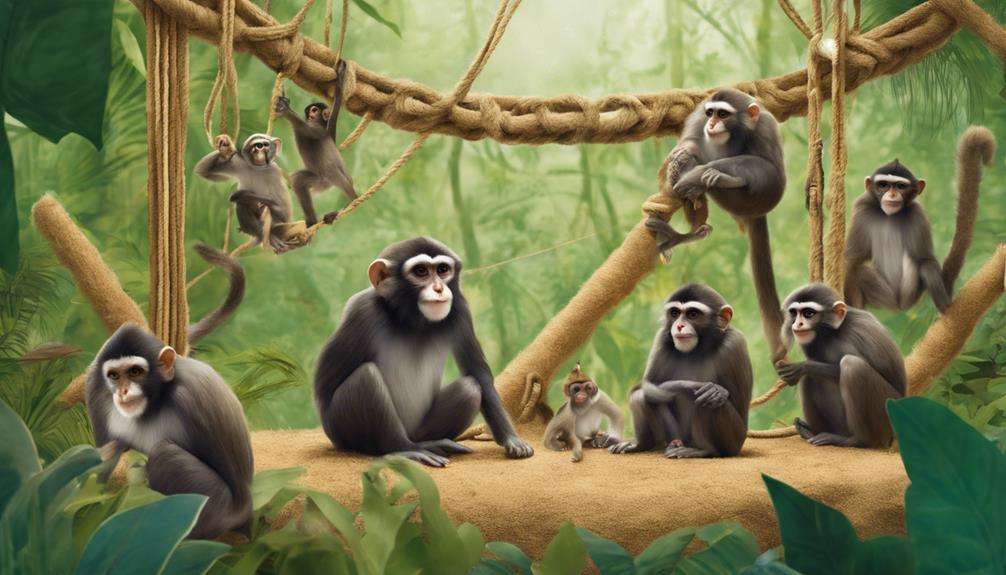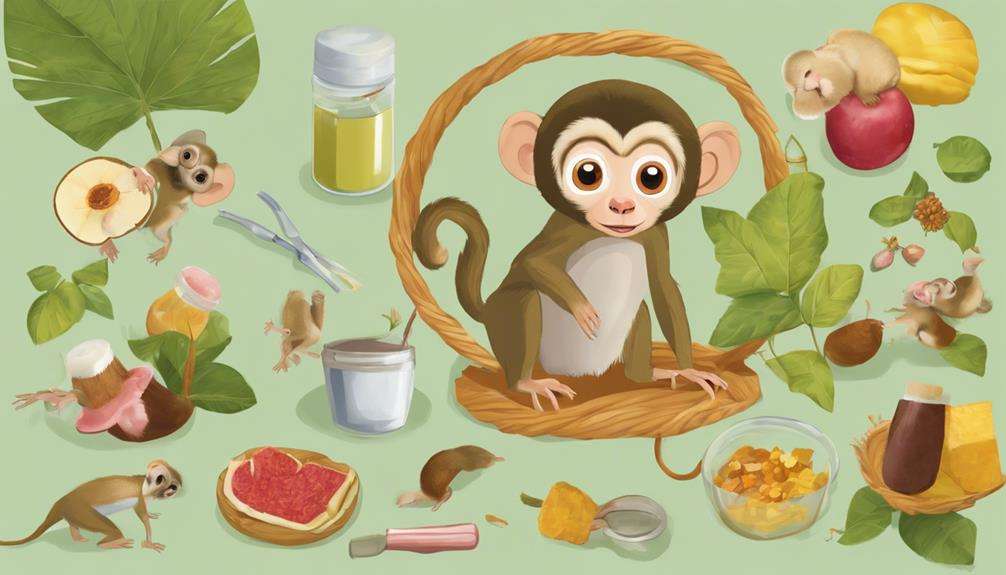Have you ever pondered the idea of welcoming an unconventional primate into your home?
The allure of these fascinating creatures goes beyond their charming appearances and intriguing behaviors.
As you explore the complexities of primate ownership, you'll uncover a world where responsibility, dedication, and ethics intertwine to create a unique bond between humans and our closest relatives.
Key Takeaways
- Primate ownership offers unique social dynamics and communication styles.
- Responsible ownership contributes to conservation efforts and genetic diversity.
- Understanding legal and ethical considerations is crucial before considering a primate pet.
- Enrichment activities and proper care are essential for the well-being of unconventional primate pets.
Legal Considerations for Primate Ownership
Legal restrictions on primate ownership vary greatly by jurisdiction due to concerns related to animal welfare and public safety. Owning primates as pets is illegal in many states due to the complexities involved. Individuals obtaining permits for pet monkeys may be subjected to home inspections to guarantee compliance with regulations. Additionally, insurance policies for primate owners might require additional coverage or be canceled altogether due to the high risk associated with owning these animals.
The laws surrounding primate ownership differ globally, with some regions completely prohibiting primates as pets. Illegal wildlife trafficking plays a significant role in the acquisition of primates as pets, raising serious ethical and legal concerns. This illicit activity not only harms the primates involved but also contributes to the disruption of ecosystems and biodiversity.
It is essential for prospective primate owners to understand and abide by the legal considerations in place to protect both the animals and the public. Proper enforcement of regulations is vital to safeguard animal welfare and prevent potential dangers associated with owning primates as pets.
Health and Safety Concerns With Unconventional Primates
Ownership of unconventional primate pets raises significant health and safety concerns due to the potential risks associated with zoonotic diseases, specialized veterinary care challenges, behavioral issues, dietary requirements, and habitat needs.
Zoonotic diseases like tuberculosis and B virus can be transmitted from these primates to humans, necessitating caution and proper hygiene practices. Finding veterinarians with the expertise to care for unconventional primates can be difficult and expensive, requiring owners to invest in specialized veterinary care.
Behavioral issues such as aggression and social challenges in these animals can lead to safety concerns for owners and others around them. Meeting the specific dietary and habitat requirements of unconventional primate pets is essential for their best health and well-being.
Additionally, these primates may exhibit destructive behaviors in home environments, posing safety hazards and causing property damage. Understanding and addressing these health and safety concerns are important aspects to bear in mind before bringing an unconventional primate pet into your home.
Unique Behavioral Traits of Exotic Primate Pets
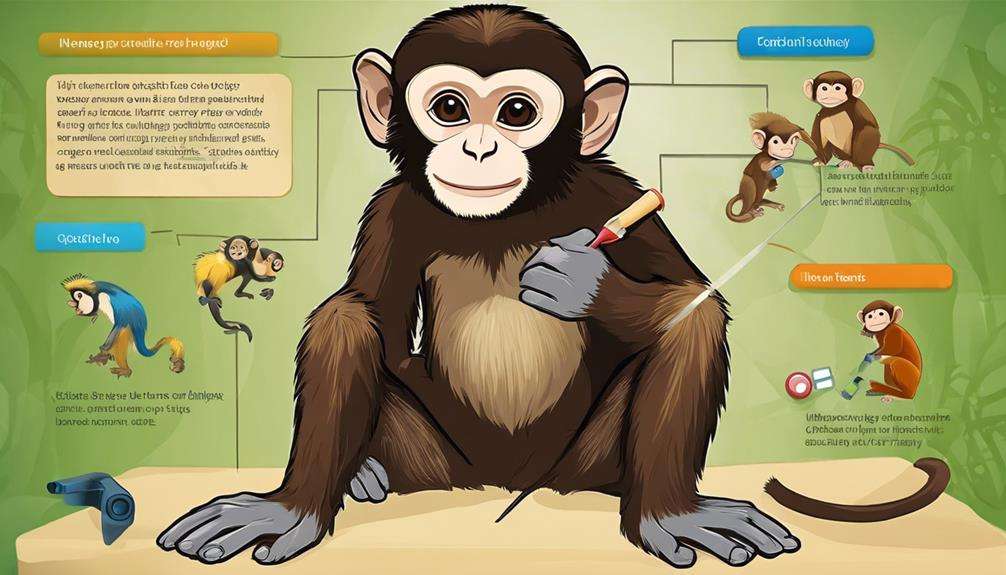
Exotic primate pets possess intricate social hierarchies and diverse communication styles, essential for maintaining group cohesion and organization.
Their problem-solving abilities and tool usage showcase their cognitive aptitude and adaptability to various environments.
Grooming rituals, vocalizations, and playful behaviors serve as mechanisms for establishing social bonds and fostering relationships within primate communities.
Primate Communication Styles
Primate communication styles among exotic pets encompass a diverse array of vocalizations, gestures, and social behaviors that facilitate intricate interactions within their social groups. Vocalizations, such as calls and screams, aid in conveying emotions and warnings, while gestures like facial expressions and body movements help express intentions and establish social hierarchies.
Additionally, exotic primate pets use scent marking to communicate territory boundaries and reproductive status. Social grooming serves as a bonding activity and communication tool, reinforcing relationships within the group. Play behavior in exotic primates not only fosters social skills but also strengthens group cohesion.
Dominance displays, including posturing and vocalizations, play an important role in establishing and maintaining social order among primate pets.
Social Hierarchy Dynamics
While observing the social interactions of exotic primates, one can discern the intricate dynamics of their social hierarchy through their unique behavioral traits. Exotic primate pets display dominance hierarchies, where individuals establish their rank through various behaviors such as aggression, submission, or grooming. These behaviors are important for maintaining social order and reducing conflicts within the group.
Communication among exotic primate pets is multifaceted, involving vocalizations, body language, and facial expressions to convey messages about their social status and intentions. Social bonding is essential for the well-being of exotic primate pets, as it fosters cooperation, support, and mutual protection within the group.
Understanding the social hierarchy dynamics of exotic primate pets is necessary for ensuring their social needs are met and promoting their mental health.
Cost Analysis of Owning Unconventional Primates
When considering the cost of owning unconventional primates, it's essential to analyze the initial investment and ongoing monthly expenses. Budgeting for food, housing, veterinary care, and specialized items is vital in understanding the financial commitment required for primate ownership.
Unexpected medical costs and emergency care for exotic primates should also be factored in to accurately assess the total cost of owning unconventional primate pets.
Ownership Expenses Breakdown
Considering the significant initial investment required and ongoing expenses for specialized care, owning unconventional primates entails a substantial financial commitment. The cost of unconventional primate pets can range from $5,000 to $50,000 initially, depending on the species.
Additional ownership expenses include specialized diets, veterinary care, and habitat maintenance, all contributing to the overall financial investment. These primates have a long lifespan of 20 to 40 years, necessitating continuous financial support.
Monkeys, in particular, may require specific insurance coverage, and permit holders could undergo home inspections to make compliance with care standards and regulations. Finding a veterinarian experienced in treating unconventional primates might be challenging, potentially leading to high medical costs.
Budgeting for Primate Care
To effectively budget for primate care, it's essential to meticulously analyze the costs associated with owning unconventional primates. Financial investment in unconventional primates can vary greatly, with prices ranging from $5,000 for capuchin monkeys to as high as $50,000 for chimpanzees.
Apart from the initial purchase cost, ongoing expenses arise from specialized diets and veterinary care tailored to their specific medical needs. Finding a veterinarian willing and able to treat unconventional primates can be challenging and expensive due to the expertise required. Conditions like diabetes are prevalent among unconventional primates, necessitating constant monitoring and potentially costly medical interventions.
As a result, a substantial long-term financial commitment is imperative to ascertain the well-being and proper care of unconventional primates.
Enrichment and Socialization Needs for Pet Primates

Pet primates, like other social animals, necessitate mental stimulation and opportunities for socialization to maintain their well-being and prevent behavioral issues. Socialization with conspecifics is important for pet primates as it mirrors their natural social structures and provides them with necessary companionship. Without proper socialization, pet primates can suffer from loneliness, depression, and may exhibit aggression towards their owners or other animals. Offering opportunities for interaction and play with other primates can greatly enhance their quality of life and prevent behavioral problems.
Enrichment activities play a critical role in the mental and physical health of pet primates. Providing them with tasks like foraging for food, puzzle toys to stimulate their problem-solving skills, and climbing structures for physical exercise can prevent boredom and promote their natural behaviors. These activities not only keep them mentally engaged but also help in reducing stress and anxiety that can arise from captivity.
Potential Challenges in Housing Exotic Primate Species
Housing exotic primate species presents significant challenges related to creating secure and spacious enclosures that prioritize safety and prevent potential escapes. These enclosures must be large enough to accommodate the natural behaviors of exotic primate species, providing areas for climbing, swinging, and exploring.
Environmental enrichment is important for their well-being, with the inclusion of climbing structures, foraging opportunities, and objects that stimulate mental engagement. Temperature and humidity control within the enclosures are essential to mimic their natural habitat and support their physiological health.
Regular veterinary care and specialized attention are necessary to address any health concerns promptly and guarantee the overall welfare of the animals. Understanding the social needs of each primate species is crucial for promoting their mental and emotional health, as social interactions play a significant role in their overall well-being.
Housing exotic primate species demands meticulous planning, attention to detail, and a commitment to providing the necessary care and environment for these animals.
Responsible Breeding and Conservation Efforts
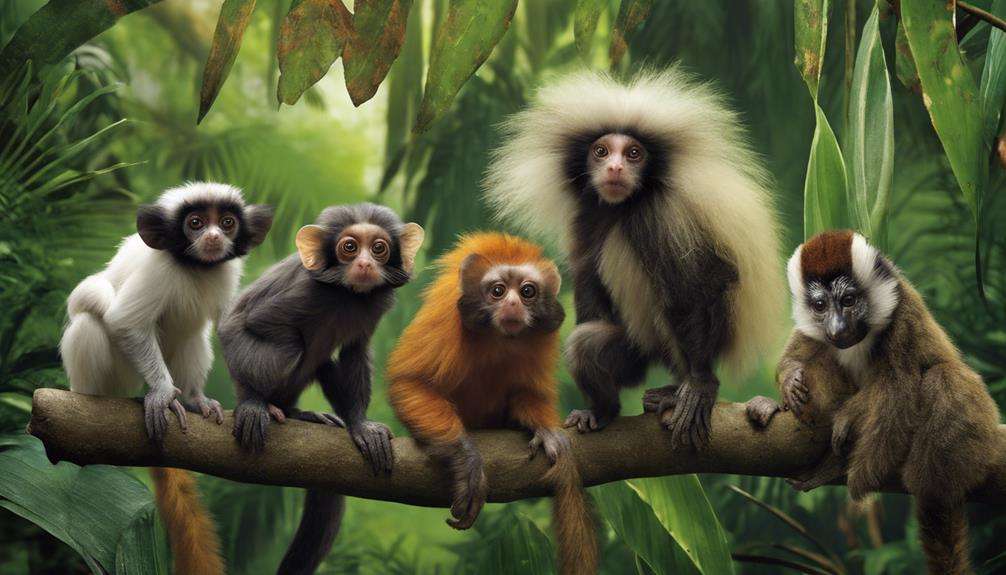
Preserving endangered primate species necessitates responsible breeding practices and dedicated conservation efforts to guarantee the genetic diversity and long-term survival of these populations. Ethical breeders play a pivotal role in ensuring the welfare of primate pets and the conservation of their wild counterparts. By maintaining healthy and sustainable captive populations, ethical breeders contribute to the genetic diversity essential for the resilience of endangered species.
Conservation breeding initiatives prioritize the well-being and future of primate species by adhering to strict breeding protocols and focusing on the long-term viability of populations. Through responsible breeding practices, genetic variation is preserved, reducing the risks associated with inbreeding depression and ensuring the adaptability of primate species to changing environments.
Consequently, the collaboration between ethical breeders and conservation efforts is fundamental in safeguarding endangered primate species and promoting a sustainable future for these remarkable creatures.
Frequently Asked Questions
Why Primates Don't Make Good Pets?
Primates don't make good pets due to behavior problems, legal complications, health risks, social isolation, training challenges, space requirements, and zoonotic diseases. These factors contribute to the unsuitability of primates for domestic ownership.
Should Primates Be Kept as Pets?
Keeping primates as pets raises ethical concerns, poses safety risks due to their unpredictable behavior, and increases the likelihood of zoonotic diseases transmission. Legal restrictions exist due to these issues, highlighting the need for better enclosure requirements to prevent social isolation.
What Are the Cons of Having a Pet Monkey?
Having a pet monkey comes with cons like aggressive behavior, zoonotic diseases, legal restrictions, costly care, vast space needs, socialization requirements, and their long lifespan. Consider these factors before welcoming a primate into your home.
What Are the Benefits of Non Human Primates in Research?
Non-human primates play a pivotal role in scientific advancements, behavioral studies, and medical breakthroughs. Their cognitive abilities offer insights into social dynamics and ethical implications. Studies with them help advance human health, neurology, and conservation efforts.
Conclusion
To sum up, despite the allure of unconventional primate pets, the complexities and risks associated with their ownership shouldn't be overlooked.
The intricate needs of these animals, from legal constraints to specialized care requirements, highlight the impracticality of keeping them as pets.
While the idea of having a primate companion may seem appealing, the reality of meeting their welfare needs and the ethical implications involved paint a stark picture of the challenges and responsibilities that come with such a decision.

